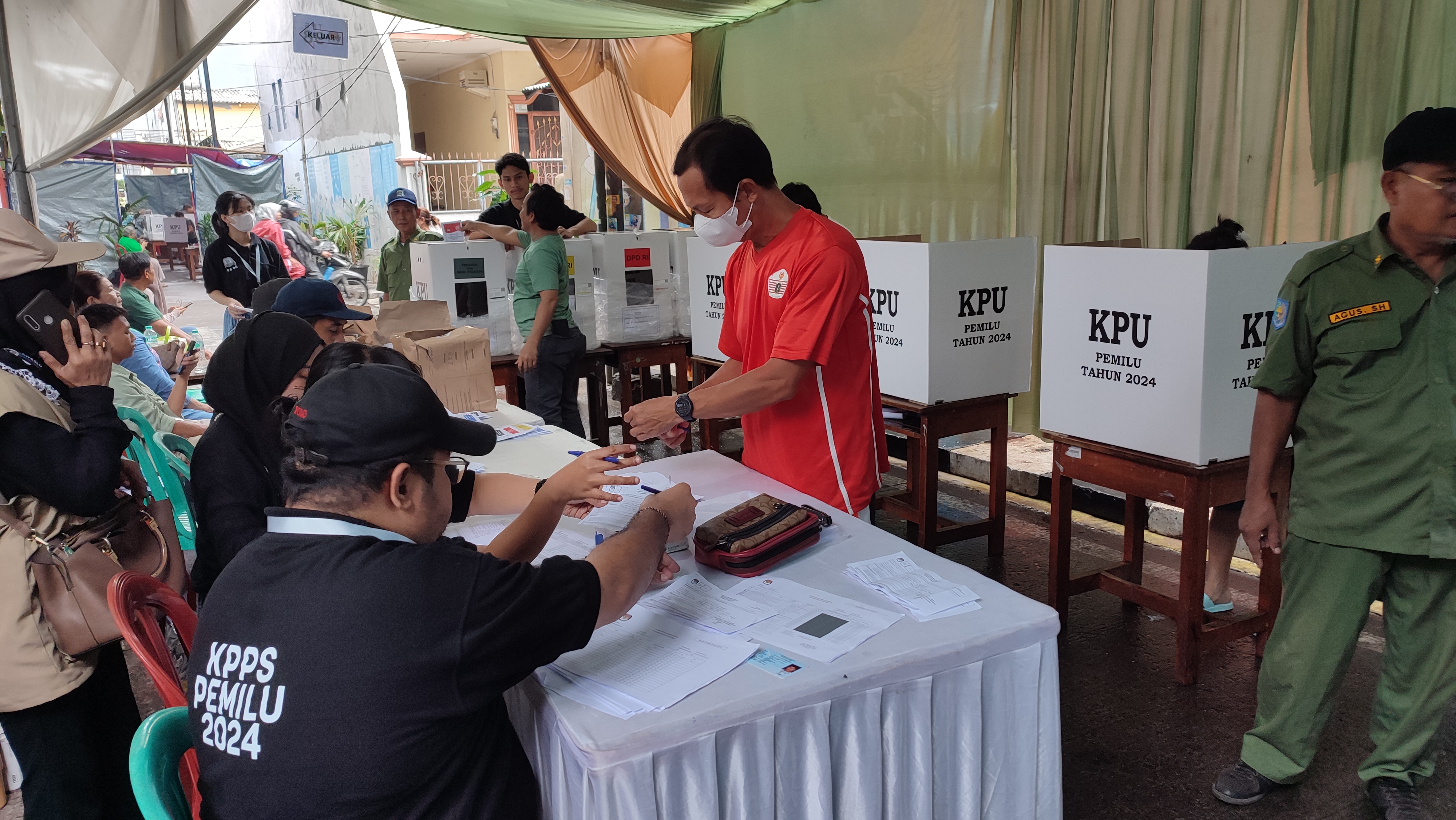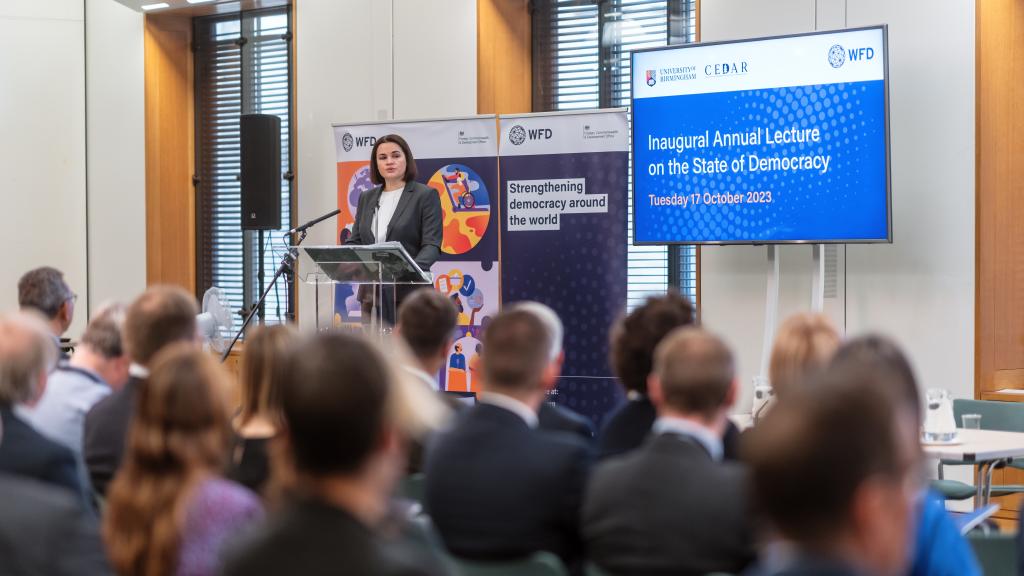Past events

On 12 November 2021, WFD convened a panel discussion as part of the COP26 public events programme. This event was held in collaboration with the World Resources Institute (WRI), International IDEA, Climate Action Network (CAN), E3G and the Business, Energy and Industrial Strategy Committee (BEIS) of the UK House of Commons.

How do civil society organisations and change-makers use informal platforms to advance equality?
WFD and Kaleidoscope Trust’s programme on equality in the Commonwealth was designed to help foster an environment in which local decision-makers and civil society actors are better able to advance equality and ensure that women and girls, and LGBT+ people are included in politics and society. It worked to help create space and opportunity for enhanced collaboration and engagement between lawmakers and civil society organisations.
Strong links and relationships between civil society, thought-leaders, and decision-makers make it easier for them to work together for equality. Strengthening these relationships and enabling change-makers to learn from one another was a key aim of the programme.
On 23 March 2021, WFD and Kaleidoscope Trust hosted an event to explore the role that informal political spaces can play in creating change for women, girls and LBGT+ people.
Shannon O’Connell, WFD’s Director of Programmes, facilitated a conversation between:
- Kim Simplis Barrow, Former First Lady of Belize
- Joleen Mataele, Tonga Leitis Association
- The Hon. Frederica Tuita, Princess of Tonga
- Caleb Orozco, United Belize Advocacy Movement
- He-Jin Kim, AIDS and Rights Alliance for Southern Africa

The COVID-19 pandemic requires governments to respond to the health emergency and address the subsequent economic shock. Mitigating the effects of the pandemic requires financial resources at a time when the economic activities and Gross Domestic Product (GDP) are declining. As governments roll out economic recovery packages and borrow to compensate for the loss of revenues due to the crisis, the public debt in many countries is increasing sharply. The global economic crisis resulting from COVID-19 has pushed some countries closer to the edge and others over the cliff into debt distress.
In some countries, public debt is eating up government financial means and undermining implementation of the Sustainable Development Goals (SDGs). If rising debt costs are not addressed (restructured or reduced), new revenues will not give governments the fiscal space they need to strengthen healthcare systems, pursue women’s economic empowerment programs, ensure free public education through secondary school, or adapt infrastructure to mitigate for climate change, for example.
As parliaments have the power to oversee the budgetary measures adopted to mitigate the effects of the pandemic, they also have an urgent duty to scrutinize the increasing public debt. Often, parliaments and MPs have little information at hand on the public debt situation and strategy to tackle that debt. Parliaments should be provided with detailed information on the structure, sources and long-term estimated effects of debts as well as the conditions attached to credits and loans

President-elect Joe Biden has said he will put democracy front and centre of US foreign policy. But after the turbulence of recent years, reversing the global trend towards autocracy will need a strategy and strong alliances. What do we know about his plans?
It is tempting to think that the Biden administration will simply turn back the clock in its foreign policy – re-joining the WHO, re-committing to the Paris Climate Accords, re-starting the Iran agreement, and renewing U.S. support for NATO and the rules-based international system. But the global context has evolved since Biden was last in the White House and his pledge to host a Summit of Democracies is a clear signal that he sees a decline in democratic values as a threat to US and Western interests. If the Summit is held while the UK is chairing the G7 and COP26 next year, then transatlantic collaboration will be key to its success.
Join us in this live online event as our top guests unpack and explain the key pillars of Biden’s plans to rebuild global democracy and the transatlantic dynamics. Our panellists are either directly engaged in this planning or close observers and can shed light on the key priorities, including human rights, corruption, countering hostile states, and tackling climate change. They can also discuss the mechanics of the transition from the Trump administration and what we can expect over the coming months.
Speakers
- Dr Frances Z. Brown, Senior Fellow, Carnegie Endowment for International Peace
- Alex Thier, Senior Democracy Fellow, Freedom House
- Anthony Smith, Chief Executive, Westminster Foundation for Democracy (Chair)

The British Foreign Policy Group and Westminster Foundation for Democracy were delighted to host a lively panel discussion on how the Global Britain project can best merge the promotion of democratic values with our geo-strategic interests.
On the eve of the publication of the Integrated Review of the UK’s Security, Defence, Development and Foreign Policy, this event explored how Britain should seek to achieve its stated ambition to advance democracy worldwide. In particular, how to approach the task of building meaningful cooperation amongst allies old and new, to counter the rise of authoritarian states and their diplomatic power.
Panellists discussed how best to strike the right balance, when the UK’s economic, security, diplomatic and development objectives may come into competition in a changing world – and whether initiatives such as the D10 could help to add muscle to the voice of liberalism, providing a meaningful new avenue for the UK’s global leadership.

Most scholarship and policy work on understanding parliaments focuses either on parliaments as systems or on the MPs within them as individuals. Anthropological analysis provides insight into the missing links – relationships and processes of interaction – thereby helping to explain what goes on between MPs (and others) in their everyday political work.
In this session, Emma Crewe provided a theory of MPs’ work that aimed to throw light on political relationships. MPs’ work entails endlessly shapeshifting, adjusting to different audiences and pressures, so they have to rely on shared processes (riffs, rhythms and rituals) to create a sense of continuity and stability. To understand MPs’ work, and to assist them in strengthening their capacity to deepen democracy, she argued we should give attention to these riffs, rhythms and rituals and how they impact on relationships within our political worlds.
Key questions of exploration:
- How can we deal with MPs’ diversity of needs, pressures and challenges?
- How much do cultural and political differences in each place create different kinds of relationships between MPs and others?
- How can relationships between MPs, but also with the media, civil society, constituents and others, contribute to a deeper democracy in specific places?
Emma Crewe is a Research Professor at SOAS and a Research Supervisor at the University of Hertfordshire. She has worked in international development since the 1980s as a social scientist, policy adviser, manager and trustee/chair in international NGOs. Her ethnographic research into organisations focuses on parliaments in the UK, Eastern Africa and South Asia and she has advised the UK Parliament on research, management and evaluation, working with and advising the House of Commons on key issues and reports. Her forthcoming book (“An Anthropology of Parliaments”, Routledge) offers a review of what anthropologists have written so far about these institutions since the 1980s and examines how MPs behave in parliament.

Join us on Friday, 14 March 2025, for an inter-active webinar, organised by the Global Community of Practice on PLS in cooperation with the Parliament of South Africa, Chamber of Deputies of Chile and the University of London, on gender-sensitive impact assessments of legislation.

The Electoral Integrity Project and WFD are pleased to announce a significant three-day online workshop examining electoral reform and democratic practices globally.

The Democracy Action Partnership (DAP) 2024 focuses on WFD’s extensive research on the Cost of Politics - the costs of running for and maintaining political office.

Join us for an engaging webinar with Dr. Tom Caygill, author of a recent report on Post-Legislative Scrutiny (PLS) in the Scottish Parliament. Discover how PLS serves as a powerful tool to assess the real-world impact of legislation long after it becomes law.

